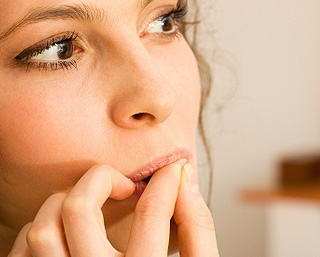 Anxiety affects between 10-15% of the population, although most people never seek treatment. The root meaning of the word is to ‘vex or trouble’. [1]
Anxiety affects between 10-15% of the population, although most people never seek treatment. The root meaning of the word is to ‘vex or trouble’. [1]
What is Anxiety?
Anxiety is a generalised mood condition which can cause a feeling of fear, uneasiness, worry or dread[2].
At some point, all of us experience anxiety, as a normal reaction to stress or fear. In fact, anxiety is very useful in potentially dangerous or stressful situations as it releases adrenaline and therefore prepares the body and mind for the ‘fight or flight’ response.
When anxiety is particularly bad or prolonged, when the feelings start without an obvious reason (i.e. not in a stressful situation) or when it starts affecting a person’s day to day life then they may be suffering from an anxiety disorder. Generalised anxiety disorder (GAD) is when a person feels anxious all the time, with no obvious reason. Panic attacks are far more likely with GAD.
Anxiety can be very intrusive and damaging to work, social situations and relationships but if help is sought then it can be very successfully treated, putting the quality back into the affected person’s life (and the lives of those around them).
Physiological Symptoms include:
- Rapid or irregular heartbeat
- Dizziness
- Dry Mouth
- Tight/painful chest and/or difficulty breathing
- Frequent urination
- Loose bowels
- Excess sweating
- Shaking
- Nausea
- Tiredness
- Hot and cold flushes
Psychological Symptoms include:
- Lack of concentration
- Feeling tense, jumpy or on edge
- Irritability
- Insomnia
- Feelings of dread and worry
- Fear of not coping or losing control
Who gets Anxiety?
Anxiety is slightly more common in women than men, although it can affect everyone. Some people appear to be more vulnerable to it just by having more of an anxious personality. Anxiety is most common amongst people in their 20’s.
What causes Anxiety?
It is not entirely clear as to what causes anxiety and there are a number of theories. It appears that some people are born with a slightly ‘anxious personality’, transferred down through genes. Distressing or traumatic situations can have a massive effect on ones anxiety, some situations like car accidents or extreme violence can have a residual negative effect even long after the incident is over. Sometimes anxiety can cause the sufferer to believe that he or she has been afflicted with a terrible disease or ailment, for example, tightness in the chest could cause the sufferer to believe they are suffering a heart attack. Obviously this then increases anxiety, the symptoms get worse, and so on. There is evidence to suggest that certain illicit drugs can cause or increase anxiety. Other mental and physical health problems such as depression or Thyroid problems can also cause or heighten anxiety. [3]
Self-help tips to decrease anxiety
- Try to relax and be calm! Avoid rushing around and stressful situations
- Get plenty of sleep and take exercise
- Avoid illicit drugs especially cannabis, LSD etc
- Make ‘to do’ lists and tackle things one at a time
- Try to avoid smoking
Treatment Available
The first step would be to see a person’s GP, who should then be able to offer some form of counselling or a referral for further assessment, to a therapist, psychologist or psychiatrist.
CBT (Cognitive Based Therapy) can be very effective in helping people to treat anxiety. In involves interpreting events and situations from a different perspective. Mindfulness, a term used to describe relaxation, awareness of the moment and non judgemental acceptance of particular situations, has also proved to be an effective treatment.
Medication is sometimes prescribed in cases of extreme anxiety or when it is coupled with another ailment such as depression.
If you are concerned that you or someone you know may require help and advice please call the Via Clinic on 01372 363939
[1] Wikipedia.org
[2] Wikipedia.org
[3] Rcpsych.ac.uk